Idlib, controlled by the Syrian Salvation Government (SSG), experiences divisions and differing viewpoints within the university education sector, concerning the employment of university graduates from areas controlled by the Syrian regime in both public and private institutions in Idlib.
The universities have been striking for five days, and protests are not new to the region, but have intensified with the influx of new graduates from regime-controlled areas, their receipt of professional licenses, and their inclusion in positions within the Salvation Government’s institutions amid limited job opportunities in northern Syria.
The Salvation Government does not enforce a decision it issued in 2022, which prohibited employing graduates from universities and institutes outside its control areas after 2016, according to students interviewed by Enab Baladi, deeming them “empty deceitful promises.”
Last week, educational and university-related social media groups in Idlib witnessed significant debates on how to handle graduates from regime-controlled areas after 2016.
Opinions were mixed, with some describing the graduates as “shabiha/thugs,” claiming they were trained in medical sectors on “the bodies of detainees and martyrs.”
Additionally, some groups have been actively publishing names of graduates from regime-controlled areas who are working in northern Syria, whether within institutions affiliated with the Salvation Government or the private sector.
Against their acceptance
Enab Baladi posed questions to twelve university students of various disciplines in Idlib, centered on why students reject graduates from regime-controlled areas after 2016, especially if these graduates do not have political affiliations with the regime, nor committed any violations.
Six students pointed to reasons for their rejection:
- Staying in regime-controlled areas over recent years implies recognition of the regime and its certifications, despite the presence of universities in Idlib.
- Graduates coming to the north due to lack of job opportunities, subsequently competing with local graduates for jobs.
- Some graduates ridicule the degrees from northern universities, boasting about their degrees from the regime’s universities.
- Universities in regime-held areas are influenced by nepotism and favoritism, unlike those in Idlib.
- Idlib university graduates have suffered under bombings, and many delayed their graduation by years, thus deserving priority in employment and job opportunities.
Two students expressed outright rejection of accepting these graduates based on religious and ideological grounds, seeing such an act as forbidden and a betrayal to the blood of martyrs.
Conditional acceptance
Three students, when questioned by Enab Baladi, mentioned that accepting these graduates in Idlib should follow certain mechanisms and conditions:
- Validation of their degrees with a stamp from the Salvation Government.
- Examinations should be conducted.
- Withdrawal of their current degrees and providing them with standardized tests followed by issuing new degrees from Idlib universities.
- Preventing these graduates from holding senior positions in government institutions.
- Requiring them to undergo re-education for two or three years at universities in Idlib.
Unethical exclusion
Three students deemed the rejection of graduates from regime-controlled areas illogical and arbitrary, not aligned with the principles of the revolution and freedom. They viewed it as exclusion and seizing of rights, highlighting the ethical concerns this brings and the deepening divide among Syrians, and argued for prioritizing employment based on experience and capability regardless of the diploma’s origin, provided no violations had been committed.
Enab Baladi conducted an informal survey through a post in an Idlib university student group, asking similar questions; opinions varied but did not exceed the context of these answers.
Committee to monitor certificates
On May 6, the Salvation Government announced the establishment of a 17-member committee, mostly government officials and university figures from the area, along with engineers, lawyers, and representatives of the Student Union in Idlib, to oversee the dossier of university certificates from regime-controlled areas post-2016 in light of recent protests.
The Salvation Government assigned the committee two tasks: studying the certificates issued from regime universities after December 31, 2016, and considering the conditions and criteria for accepting them; and reviewing certificates from areas under the Syrian Interim Government (SIG) in rural Aleppo, offering benefits to graduates recognized by the Higher Education Ministry of the Salvation Government from employment, postgraduate programs, to professional licensing rights.
University students in Idlib reject the employment of graduates from Syrian regime-controlled areas – May 4, 2024 (Enab Baladi/Anas al-Khouli)
Compromised decision
On September 5, 2022, the Salvation Government issued a decision to prohibit graduates of universities and institutes in Syria outside its controlled areas from working for its ministries and affiliated agencies after 2016 unless certain conditions were met.
The Salvation Government gave priority for employment to graduates of Syrian universities in the “liberated” areas (Idlib and its countryside).
The Salvation Government required for overriding the ban, the equivalency of the academic qualification at its Ministry of Higher Education and residency in its controlled areas for no less than five years.
Despite the decision at that time, news spread about the appointment of graduates from regime universities in institutions in the area, which angered the students in Idlib and prompted them to organize a protest in November 2022 in front of the presidency building of Idlib University.
Northern Syria faces unemployment, compounded by youth migration, rising crime rates, and increasing poverty levels, with unemployment rates among civilians reaching an average of 88.74% (considering day laborers in the aforementioned categories).

